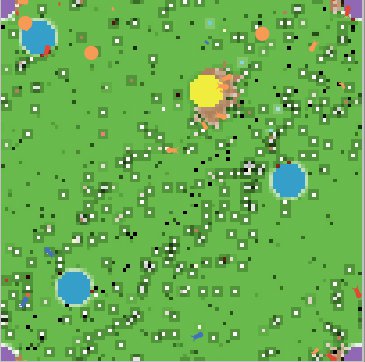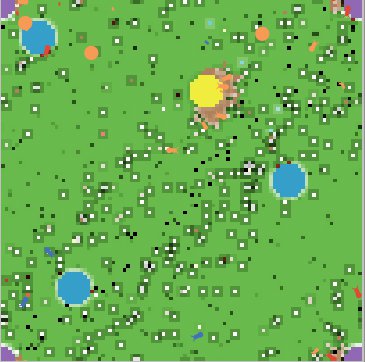Umwelten Ants (1.1.0)
Leafcutter ants, Atta cephalotes, are dominant herbivores in South American rainforests and have a diverse life history, punctuated by their fungal spore farming which results in often massive colony sizes (Hölldobler & Wilson, 2010). When observing A. cephalotes colonies near Manaus, Brazil, the author watched three colony members kill each other. In ant colonies, sterile workers cooperate to rear colonial young, which means that these colony mates were related, and so should not engage in intra-colony competition because of the associated net loss (Townsend et al., 2008). If fitness in a biological system is comparable to profit in an economy (Holland, J., 2006), how can ant colonies of A. cephalotes in Brazil kill their nestmates for a net loss? The simulation models this interaction Through Netlogo.

Release Notes
We updated the base model to include colony reproduction to test whether murder is heritable in the social system.
Associated Publications
Umwelten Ants 1.1.0
Submitted by
Kit Martin
Published Aug 27, 2015
Last modified Dec 05, 2024
Leafcutter ants, Atta cephalotes, are dominant herbivores in South American rainforests and have a diverse life history, punctuated by their fungal spore farming which results in often massive colony sizes (Hölldobler & Wilson, 2010). When observing A. cephalotes colonies near Manaus, Brazil, the author watched three colony members kill each other. In ant colonies, sterile workers cooperate to rear colonial young, which means that these colony mates were related, and so should not engage in intra-colony competition because of the associated net loss (Townsend et al., 2008). If fitness in a biological system is comparable to profit in an economy (Holland, J., 2006), how can ant colonies of A. cephalotes in Brazil kill their nestmates for a net loss? The simulation models this interaction Through Netlogo.
Release Notes
We updated the base model to include colony reproduction to test whether murder is heritable in the social system.

